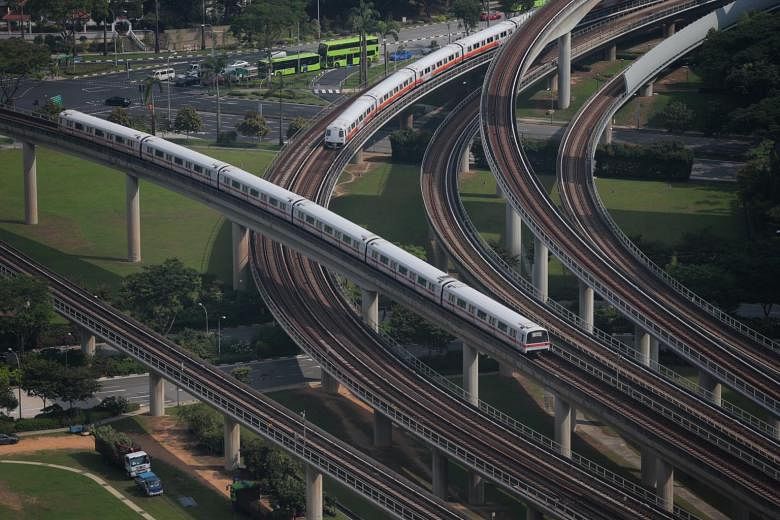SINGAPORE - Trains for the Jurong Region Line (JRL), slated to be operational from 2026, will have emergency batteries which will allow them to be driven to the nearest station should there be a power failure.
They will be the first trains to have such a feature. Today, passengers on a stranded train have to disembark and walk along the tracks to the nearest station if a rescue locomotive cannot get to them.
Transport Minister Khaw Boon Wan announced this at the signing ceremony at the Land Transport Authority headquarters in Hampshire Road for the train supply contract on Thursday (Feb 6).
The $416.5 million deal went to Hyundai Rotem Co, an established South Korean group which has clinched its maiden train supply contract here.
It will supply 62 three-car driverless trains for the JRL, a medium-load elevated rail line with stations which can accommodate four-car trains serving places such as the Jurong Lake District, the Jurong Innovation District and Nanyang Technological University.
Like all new trains slated for Singapore's network, the JRL trains will have condition-monitoring systems to detect faults in real time, as well as wider doors for speedier access.
Mr Khaw said Hyundai Rotem "has committed to establish a base in Singapore, to facilitate knowledge transfer and technical support to the JRL operator", allowing it to provide long-term service support.
The company has supplied trains to metros in cities such as Seoul, Hong Kong and Vancouver. It had also worked on the mid-life refurbishment of Singapore's first-generation trains for the North-South, East-West lines.
The minister said the JRL will further enhance rail connectivity in the north-west. "More direct journeys from north to west will become possible," he said. "For instance, if you are a PSA worker living in Choa Chu Kang West, you can halve your journey time to Tuas Link station to around 30 minutes.
"An NTU student from Boon Lay MRT station will similarly halve his journey time to around 15 minutes."
Mr Khaw also revealed that all existing MRT lines here have crossed the one-million MKBF mark. MKBF stands for mean kilometres before failure, and is an accepted measure of reliability.
Overall, the MRT network clocked 1.32 million MKBF at end-2019.
"This is a standard that few metros have achieved," he noted. "I would like to thank all our rail workers and LTA officers for this significant achievement."
Mr Khaw also took the opportunity to remind transport workers to "protect themselves, as well as protect commuters" during the coronavirus outbreak.


